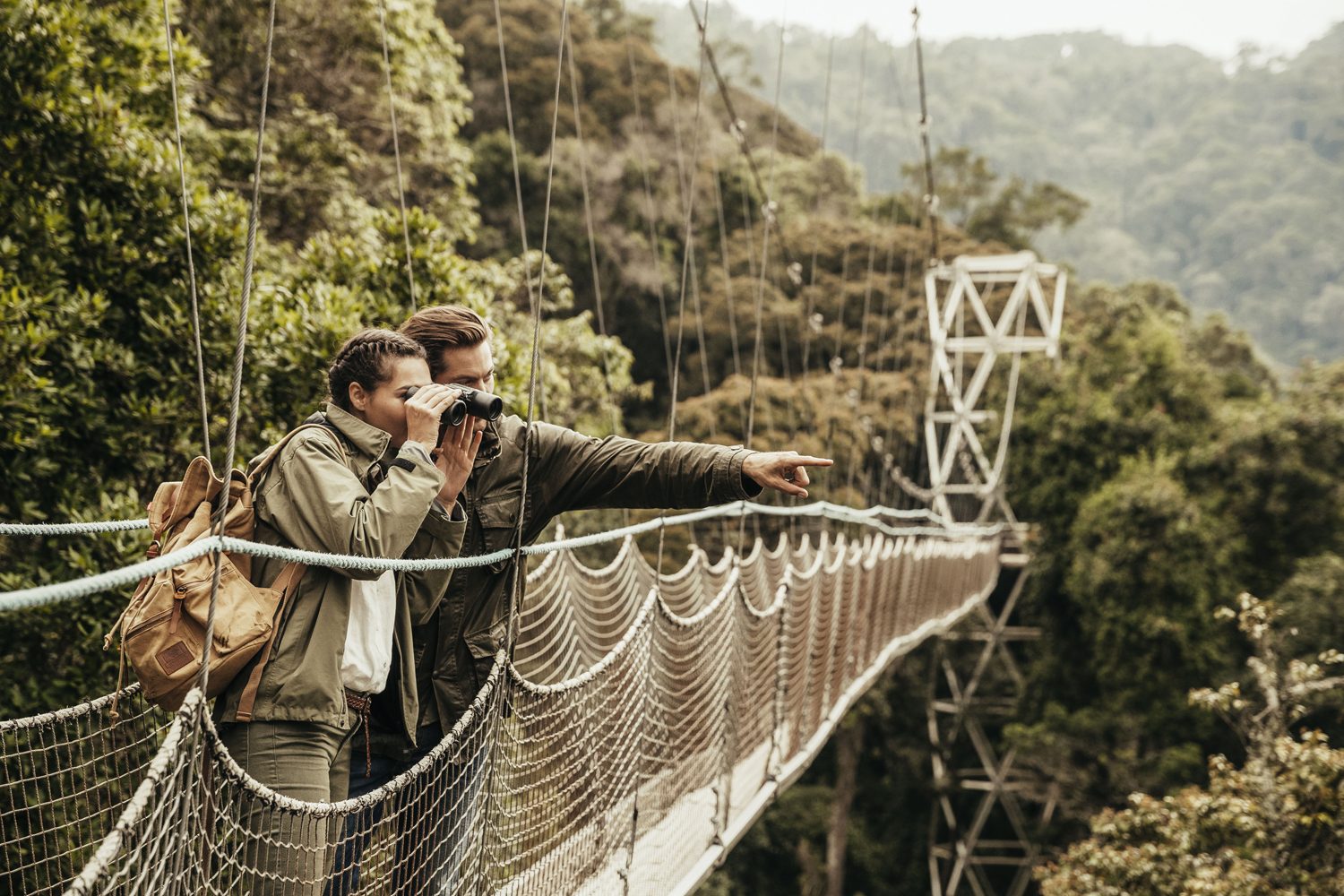Nyungwe National Forest Park
Nyungwe National Park offers a rare and important habitat for many species, especially primates and birds. And at over 1000 km2, Nyungwe is Africa’s largest protected mountain rainforest.

Nyungwe Forest National Park
With about 310 bird species, 26 of which are endemic, Nyungwe is one of the most important — and still undiscovered — bird watching destinations in Africa. Reaching almost 3000 meters above sea level with Mount Bigugu the highest point in the Park, Nyungwe’s forests extend to altitudes occupied by few other forests in Africa. Nyungwe is also home to one of Africa’s greatest concentrations of chimpanzees and a sometimes noisy, acrobatic combination of other primates such as Ruwenzori colobus and Lhotse’s monkeys. A variety of hiking and walking trails criss-cross the Park leading to a canopy walk, primate tracking adventures, the southernmost source of the Nile, and ecotourism attractions. The park includes a colorful array of orchids, butterflies, moths, and other insects. The forest has a growing network of walking and hiking trails and a number of camping sites near the Uwinka Visitor Center. Cultural tourism activities are being developed near the edge of the Park. New trails and camping sites are planned and being constructed as part of the USAID-sponsored Nyungwe Nziza Project, as are new ways of both observing and enjoying the Park.
An Ancient Forest Nyungwe forest has existed for hundreds of thousands of years and is one of Africa’s oldest. Thus, there is a possibility that climate change will not affect Nyungwe as much as other forests, as long as it is protected from threats like fires and tree cutting. Scientists think that Nyungwe was one of the few places in Africa to remain green during the last Ice Age. Species took shelter in Nyungwe and never left! It is home to a variety of plants, animals, and habitats found almost nowhere else. It is in the Albertine Rift, a mountainous section of East Africa that, as a whole, harbors more endemic birds, mammals, and amphibians than any other region in Africa. For example: over 1000 species of birds, about 52% of all of Africa’s birds, have been recorded in the Albertine Rift. Nyungwe is the largest protected area within the Albertine Rift and contains 25 of these endemics, more than any other site in east Africa. A rift is where sections of the earth are slowly spread apart over millions of years, creating mountains, lakes, valleys, and volcanoes. Lake Kivu is Visible from points in Nyungwe, it is one of the Great Lakes of Africa and the fifteenth largest in the world. Dissolved gases in the lake have the potential to generate enough electricity to power Rwanda for 400 years! Mount Bigugu is The highest point in Nyungwe, it rises 2950m.
Nyungwe and Water – Lots of Water
Nyungwe is Rwanda’s primary water catchment, sheltering more than two-thirds of all of its waters. Nyungwe receives more than 2000 mm a year of rain and thus is also the source of Africa’s great rivers. Rain that falls on the east side feeds the Nile and on the west runs to the Congo. The Congo-Nile Divide is a mountain range that runs north to south through Rwanda.
Uwinka visitor center
The Uwinka Visitor Center in Nyungwe National Park, 17 kms from Gisakura, is a great place to begin your exploration of the Park. The Center, funded by USAID, includes a reception desk showing trai,ls in the park, level of difficulty and approximate time needed to walk each trail. The Center also includes an Interpretation Center with detailed panels summarizing the history, local culture, rainfall, flora and fauna of the Park.
Acommodations in Nyungwe National Forest Park
Currently, the options in or near Nyungwe National Park are limited to the following:
The Nyungwe Forest Lodge
It was opened in mid-2010 as the first five-star establishment in the region. It was built to blend in with the surrounding environment and is situated in a tea plantation on the edge of the Nyungwe closed canopy rain forest.
The Gisakura Guesthouse
It is the next option a simple, clean establishment with shared bathrooms that are attached to the Wildlife Conservation Society’s (WCS) research station. The guesthouse includes a small restaurant actually; it’s more like the dining room in a house.
The Nyungwe Top View Hill Hotel
It was opened in early 2011 and offers one of the most commanding views of Nyungwe and Lake Kivu in the distance.
The hotel offers most 12 self-contained units with 4 twin and 8 queen size bed apartments, as well as a bar and restaurant with a spectacular panoramic terrace view.
Camping
Adjacent to the Uwinka Interpretation Center is a campsite with several individual sites and easy access to the trails. The Nyungwe Nziza Project and the Rwanda Development Board are actively working to attract investors to develop further accommodations and camping options in and around the Park.
Leave A Comment